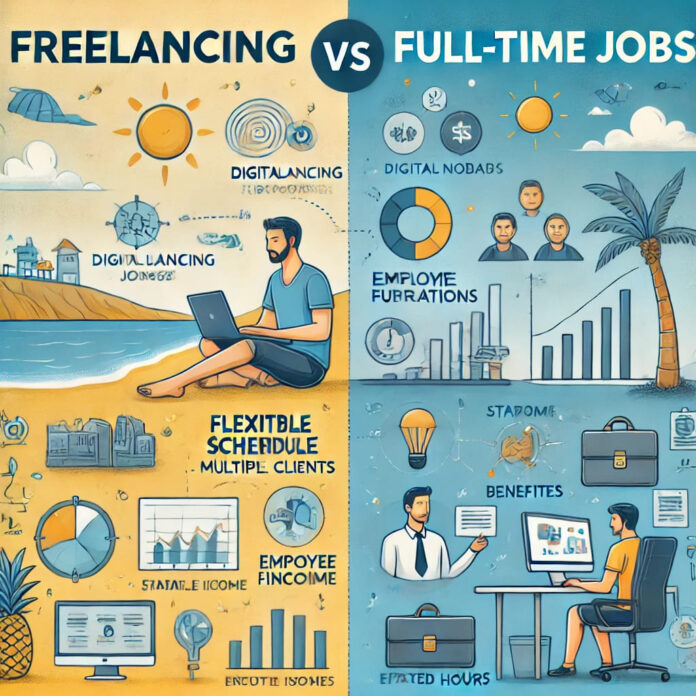“Freelancing vs. Jobs:” This question has become increasingly relevant in today’s evolving job market. With the rise of the gig economy, professionals now have more options than ever. Some prefer the stability and benefits of a full-time job, while others embrace the job flexibility and independence of freelance work. Whether you seek the security of a steady paycheck or the freedom of self-employment, understanding the pros and cons of each path is crucial. In this article, we’ll compare both career choices to help you decide which suits your lifestyle and goals.
What is Freelancing?
Freelancing refers to self-employment, where individuals offer their skills and services on a contractual basis. Freelancers often work with multiple clients instead of committing to a single employer. They enjoy greater job flexibility, choosing when and where to work, often engaging in remote work opportunities.
Advantages of Freelancing
- Job Flexibility – Freelancers set their schedules, making it ideal for those who value work-life balance.
- Diverse Income Streams – Instead of relying on a single paycheck, freelancers can earn from multiple clients.
- Location Independence – With many freelancing opportunities available online, professionals can work from anywhere.
- Skill Development – Freelancers continually learn new skills to stay competitive in the gig economy.
Challenges of Freelancing
- Income Instability – Unlike a full-time job, income can fluctuate due to inconsistent projects.
- No Full-Time Job Benefits – Freelancers don’t receive employer-provided benefits such as health insurance or paid leave.
- Self-Discipline Required – Managing multiple projects and deadlines requires strong organizational skills.
Understanding Full-Time Jobs
What is a Full-Time Job?
A full-time job is a long-term employment agreement where individuals work for a single employer. This traditional model offers financial stability and additional perks that freelancers typically don’t receive.
Advantages of Full-Time Jobs
- Full-Time Job Benefits – Employees enjoy health insurance, retirement plans, and paid time off.
- Stable Income – A fixed monthly salary provides financial security.
- Career Growth Opportunities – Many organizations offer promotions and professional development.
- Team Collaboration – Working in an office fosters networking and teamwork, which is beneficial for career advancement.
Challenges of Full-Time Jobs
- Limited Job Flexibility – Employees follow a fixed schedule and location requirements.
- Less Autonomy – Work tasks and projects are assigned by employers, limiting personal control.
- Risk of Job Loss – Economic downturns and company decisions can impact job security.
Which One is Better for You?
Choosing between freelance work and a full-time job depends on your career goals, financial needs, and personal preferences.
When to Choose Freelancing
- If you value self-employment and prefer job flexibility.
- If you have skills that are in demand in the gig economy.
- If you enjoy working independently and managing your workload.
When to Choose a Full-Time Job
- If you prioritize full-time job benefits such as health insurance and paid leave.
- If you seek job stability and a steady income.
- If you thrive in structured environments with career growth opportunities.
Conclusion
Both Freelancing vs. Jobs offer unique advantages and challenges. While the gig economy has expanded opportunities for independent workers, traditional employment remains appealing for those seeking stability and benefits. Ultimately, the best choice depends on your lifestyle, career aspirations, and financial goals. Whether you embrace self-employment or opt for a secure full-time job, understanding the pros and cons will help you make an informed decision.




